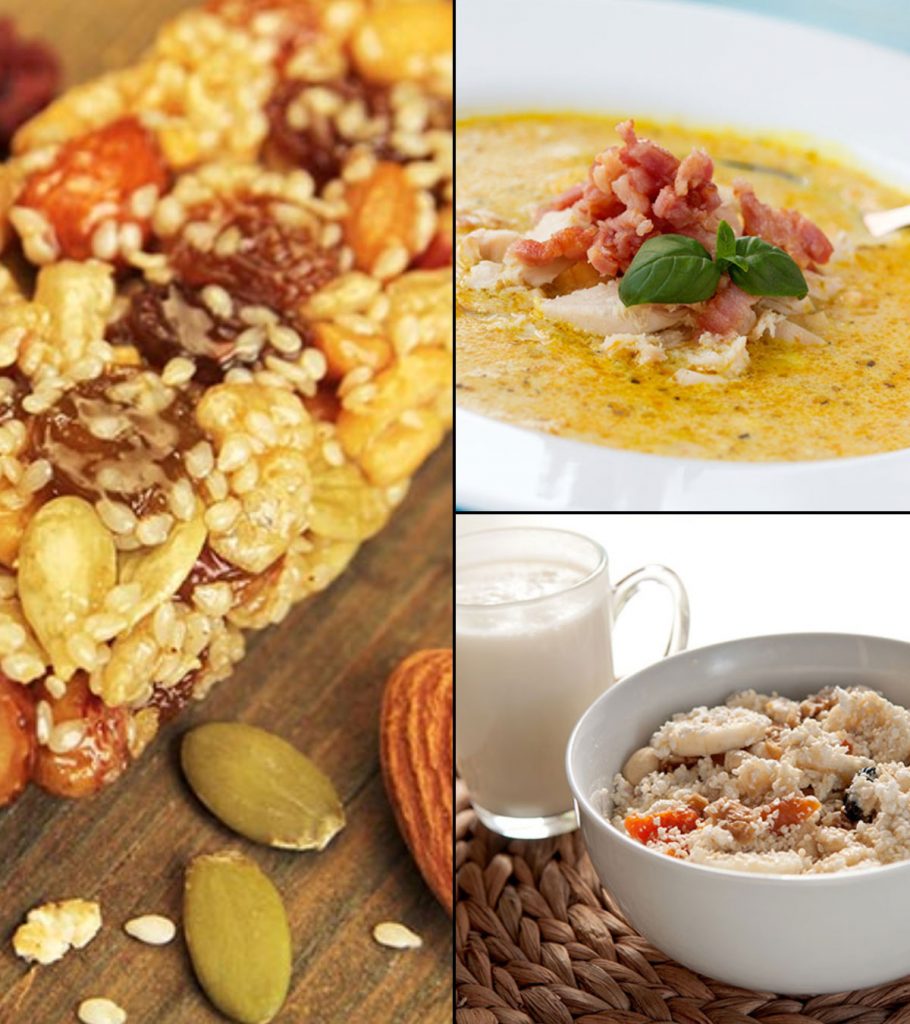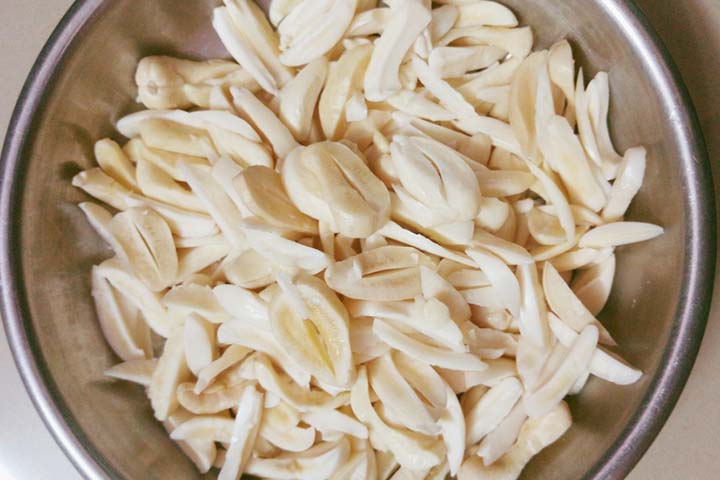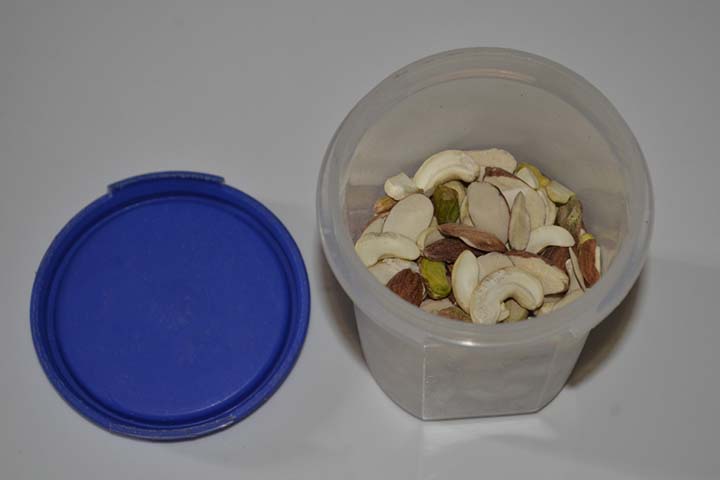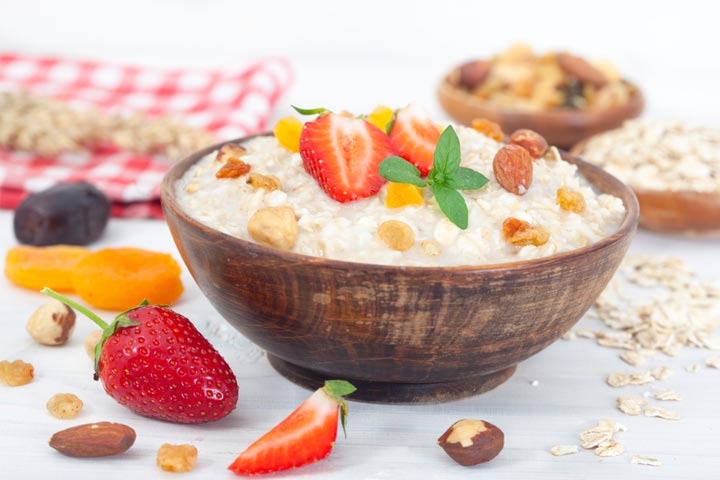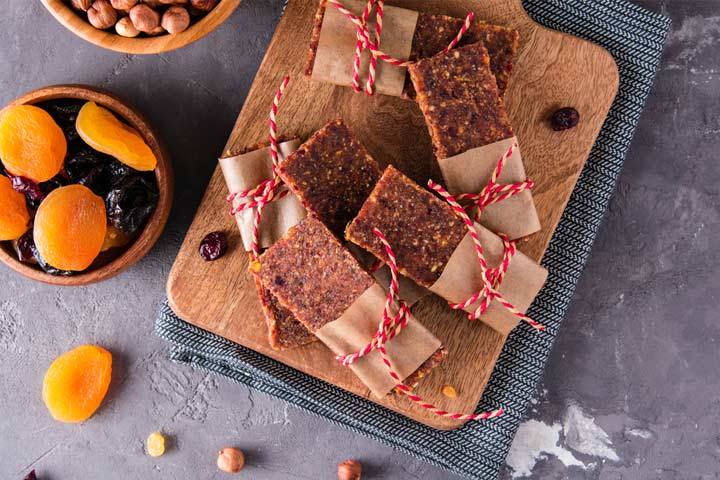Dry fruits refer to dried fruits and nuts. While the fruits are dried and shrunk after dehydration, the nuts are naturally found inside hard shells. Both are nutrient-rich that can benefit your health. Thus, dry fruits for babies seem a healthy choice to support infant nutrition for proper growth and development. But since some dried fruits and nuts can cause allergic reactions, it is important to know if feeding dry fruits is safe for babies. So, read on as we tell you more about the right age to feed dry fruits to babies, their possible health benefits, side effects, and dry fruit recipes that are worth a try.
Are Dried Fruits (Seeds and Nuts) Safe For Babies?
Dried fruits can be considered safe for babies. However, you need to be careful while feeding them to a baby due to their potential choking hazard (1). Thus, it is good to serve dried fruits in an age-appropriate manner.
For babies under one year, you can serve it in cooked, mashed, or pureed forms. Babies older than a year can be served thinly sliced and finely chopped dried fruits. It’s worth noting that according to a report by the New York State Department of Health, choking is the fourth leading cause of unintentional death in children under the age of five. Food-related incidents also account for the most common cases of nonfatal choking in young children.
When To Start Feeding Dried Fruits For Babies?
Cooked dried fruits can be introduced to babies once they are six months old (2). It is the age when babies start eating solids and also have a well-developed gag reflex. But just like any new food, talk to a pediatrician before introducing dry fruits.
Potential Health Benefits Of Dried Fruits For Babies
Dried fruits are rich in fiber, certain vitamins, minerals, enzymes, and bioactive compounds like polyphenols (3). The vast nutritional composition makes dried fruits health-promoting. Below are some health benefits of dried fruits on regular consumption and in moderate amounts.
- Nutrient-dense: Dried fruits are energy and nutrient-dense foods that help meet the overall nutritional needs of an infant. A few dried fruits that can boost your baby’s nutrient intake are apricots, figs, and dates.
- Optimum micronutrient supply: Dried fruits have a good composition of micronutrients. Their regular consumption in moderate amounts could supply essential micronutrients such as vitamins A, B3, E, potassium, magnesium, iron, and folate (4). These micronutrients ensure support for the development of babies.
- Digestive health: Dried fruits are considered rich in dietary fiber that helps in managing digestive health. Prune juice in specific has been used in traditional and modern medicine to treat and manage constipation in infants (5) (6).
- Gut microbiota: Dried fruits such as raisins could support the development of intestinal microflora (7). This property of raisins is attributed to the presence of fermentable fiber such as inulin and phytochemicals such as phenolic acids and tartaric acid, which acts as prebiotics (food for gut bacteria). Some other dried fruits that hold similar potential are prunes, dates, and figs (8).
- Immunity: Strengthening the immune system is vital for infants as they are vulnerable to infections until the age of two years. Dried fruits are rich in micronutrients and bioactive compounds that are known to possess anti-inflammatory and antioxidative properties (9). These properties help boost your infant’s immunity when dried fruits are consumed regularly.
- Anemia: Babies are vulnerable to anemia, especially between nine and 24 months (10). You can supplement your infant’s diet with dried fruits, such as raisins, prunes, and apricot, which are good sources of dietary iron.
- Bone health:Dried fruits such as prunes or dried plum have shown positive effects on maintaining bone health. The bone protective effects of prunes are attributed to the presence of micronutrients, such as vitamin K, manganese, boron, copper, and potassium (11) (12).
Possible Health Risks Of Dried Fruits For Babies
There are some health risks of dried fruits that must be kept in mind while you plan to feed them to your baby.
- Weight-related health issues: Dried fruits are rich in natural sugars like glucose and fructose. The small size of the fruits can increase the risk of overconsumption. Excess sugar intake, in the long run, is associated with several health concerns such as obesity (13).
- Candied fruits: Certain whole fruits, like apple, pineapple, strawberries, and blackcurrant, are also processed to form dried fruits. These fruits are preserved in sugar solution due to which they are also called “candies.” Babies should have fewer servings of candied fruits, which are often confused with regular dried fruits (4). Limit the intake of candied fruit to not more than one to two servings a week. Excess intake could lead to dental issues in infants (3). Also, babies might get used to the sweet taste and refuse to eat fresh fruits.
- Also, babies might get used to the sweet taste and refuse to eat fresh fruits.
- Gastrointestinal disturbances: Dried fruits are rich in dietary fiber. Thus, if consumed in excess, they could lead to gastrointestinal disturbances such as stomach cramps, bloating, gas, constipation, or even diarrhea (3).
- Allergy: Dried fruits are often preserved with the help of sulfites. Sulfites are regulated food additives that are used to preserve the color of certain dried fruits, such as raisins. Sulfites could cause allergic reactions (14). Therefore, check the label while purchasing dried fruits. Purchase dried fruits that are brown or grey in color and are preferably organic.
- Toxin contamination: Improperly stored dried fruits can be susceptible to contamination from fungi such as Alternaria, Penicillium, and Aspergillus. These fungi could release mycotoxins, which are harmful and even fatal (15). Check the date of packaging on a packet of dry fruit, and also buy them from reliable sellers.
It is also good to take precautionary steps.
Precautions To Take While Feeding Dried Fruits To Babies
Below are some precautions that you must take while feeding dried fruit to your baby (16).
- Buy packaged, organic dried fruits from a reputable store.
- Buy shade-dried fruits whenever possible. Check with the manufacturer about the method of drying before the purchase.
- Dried fruits are available in two forms – semi-moist and dry. Prefer semi-moist forms to completely dry, hard-to-eat alternatives.
- After purchase, keep the dried fruits in an air-tight container in a cold place, away from light.
- Check for possible allergies that a specific dried fruit could cause. It is important if your baby has any other allergy.
- Dried fruits have high amounts of natural sugars. Therefore, practicing portion control is vital. Do not feed more than a single serving a day.
- Dried fruits are rich in fructose, a natural sugar present in fresh fruits as well. Babies with fructose intolerance must avoid dried fruits as they could cause gastrointestinal disturbances (17).
- Always feed cooked, mashed, or pureed dried fruits to babies under 12 months of age. If you intend to serve dry fruits as finger food to an older baby, then chop the fruits in pieces that are easy to chew for the baby.
Precautionary steps allow the baby to enjoy dry fruits with little to no risks. Did you know you can also serve the dry fruits in powdered form?
Dry Or Dried Nut Powder Recipe
Powder made up of different dried fruits and nuts is ideal to use for babies. Since this powder contains a variety of dry fruits, it is considered nutrient-dense and apt to use for babies who cannot eat whole dried fruits.
You will need:
- ½ cup almonds
- ½ cup pistachios
- ½ cup cashews
- ¼ cup or 20g walnuts
- 2tbsp lotus seeds
- 1tsp cardamom powder
How to make:
- Take a flat bottom pan and put it on medium heat.
- As the pan heats, add lotus seeds or makhana, walnuts, cashews, and almonds to it. Dry roast everything, and once done, keep them aside to cool.
- Once cooled, put everything in a blender with pistachio and cardamom powder. Blend until you get a fine powder. Ensure no lumps or thick pieces are left behind.
- Store the powder in an air-tight container and put it in the refrigerator. Use it within a month.
- You can add this powder to almost any recipe, like porridge, pancakes, or make shakes with formula.
Dry Fruit Recipes For Babies
Below are some simple yet nutritionally wholesome dried fruit recipes that you can try for your baby.
1. Oats and dried fruit porridge
This recipe can be added to your infant’s breakfast plan. It has high-fiber oats with dried fruits, a source of micronutrients and bioactive compounds.
You will need:
- 1 cup rolled oats
- ½ cup dried fruit powder
- 1tsp jaggery or raisin puree
- Water
How to:
- Wash the rolled oats in the running water.
- Take a flat bottom pan and add three cups of water.
- Once the water starts to boil, add dry fruit powder and oats to it.
- Cook on a medium flame for two to three minutes. As the mix starts to bubble, lower the flame and cook on simmer for another two to three minutes.
- Pour the porridge in a serving bowl. Mix jaggery powder or raisin puree and mix well.
- Serve it hot or let it cool.
2. Dried fruit bar
This is a simple finger food recipe, ideal for babies who have started chewing. The recipe has a variety of dried fruits added together in a bar. It can be served to babies as a midday snack or as an evening snack with formula or cow’s milk (for babies older than 12 months).
You will need:
- 16oz (453g) dried fruits and nuts (almonds, walnuts, figs, apricots, prunes, raisins, and pistachio)
- 3-4 cups water
How to:
- Chop the dried fruits into small pieces and put them in a pan.
- Now add three to four cups of water into the pan and bring it to boil.
- Cook the fruits and nuts for 10-15 minutes or until they turn tender.
- Meanwhile, preheat the oven to 225°C (433°F) and prepare your baking sheet.
- Once the fruits are cooked, drain the water and blend the fruit pieces to make a smooth puree.
- Spread this puree on the baking tray and put the tray into the oven. Bake for 35 minutes.
- Once done, take out the tray and let it cool.
- Cut the bar into different shapes and serve.
To make it more crunchy and nutritious, you may add macadamias, coconut flakes, or some preservative-free organic fruits that your baby loves.
Dry fruits for babies can provide a nutritious option for their meals and snacks. These are excellent sources of protein, antioxidants, calcium, and minerals that help a baby’s overall growth and development. However, check for any allergic reaction from the potential dried fruit allergens and ensure to feed them in an easily chewable form such as puree or powdered form to prevent babies from choking on it. As long as dry fruits are fed in limited quantities and with necessary safety measures, it is a healthy ingredient to include in their meals.
Key Pointers
- Dried fruits can be a choking hazard for babies, leading to safety concerns.
- Cooked dried fruits are safe for consumption by babies starting at six months old.
- Dried fruits offer health benefits to babies such as enhanced digestion, strengthened immunity, and improved bone health.
- However, dried fruits may also negatively impact weight-related health issues in babies.
- To prevent potential health risks, it is essential to take precautions such as soaking and limiting intake of candied fruits when serving dried fruits to babies.
Check out these 6 delightful recipes utilizing baby food and weight-gaining powder to support brain development, strengthen bones, and promote healthy weight gain for your baby.
